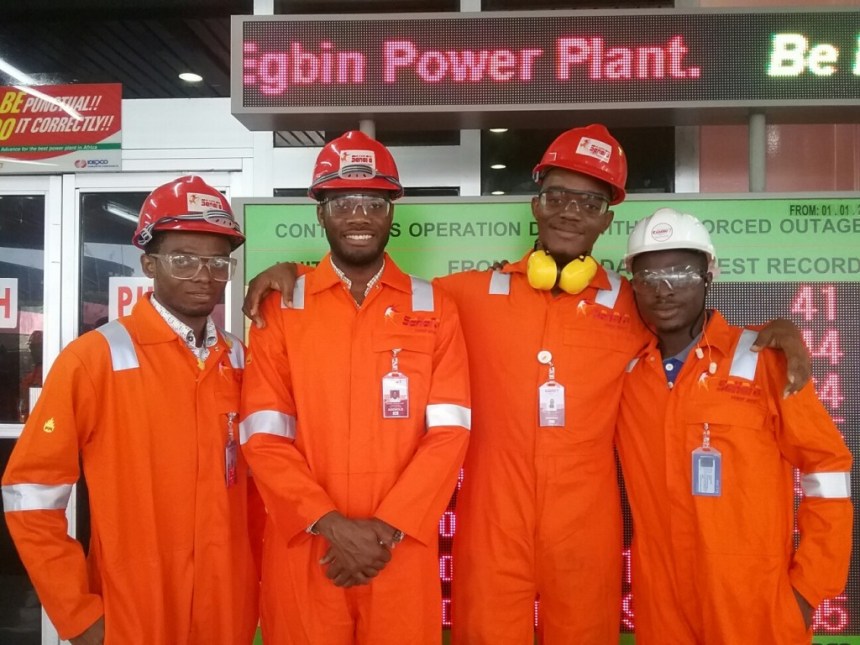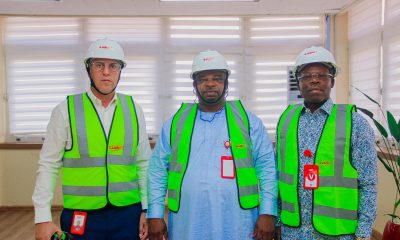Economy
Sahara Power Invests $200m in Egbin Power Plant to Generate 1,100MW

By Dipo Olowookere
Not less than $200 million has been invested in the Egbin Thermal Power Plant in Lagos by Sahara Power Group to increase its generating capacity to its present level.
Managing Director of Sahara Power Group, Mr Kola Adesina, speaking at an event organised by the firm in Lagos, stated that when the Egbin power plant was acquired by Sahara Power, it was generating 400MW of electricity. But with the huge investment made by his company, the plant now generates 1,100 MW, indicating that capacity has been more than doubled.
Mr Adesina said though the privatisation of the sector has not been smooth, there was room for improvement as long as stakeholders agree to work together.
“The privatization occurred in 2013 has not been a smooth one. We successor companies have had to embark on a long, protracted curve of learning to fully appreciate the complexity and the magnitude of the behemoth sector we now captain.
“Like young adolescents we have been compelled to grow and mature rapidly to rise up to the burden of responsibility placed on us,” he said at the Sahara Power Roundtable.
Speaking on why the forum was organised, the Sahara Power chief said the gathering was to create a platform to bring every leading actor across the value chain together on one plenary for the benefit of journalists and the consumer.
“Through discourse and constructive conversation, we hope to examine the current state of the power sector in Nigeria and how both the intrinsic and extrinsic are combining, evolving and reacting against each other to shape the future,” he disclosed.
Speaking on how policy can further drive the sector, Mr Adesina submitted that, “There is need to constantly do a systemic revaluation of every policy that is churned out.
“I want to recommend to government and policy makers that any action being taken, every stakeholder, the relevant public that will be affected by the policy must assess the degree to which those policies will affect them.
“While it is easier for economists to speak to the theory of pricing from the standpoint of cost, revenue and profit, affordability is another issue some are not paying attention to.
“We all are aware that there are citizens in Nigeria who are not employed and/or incapable of paying the appropriate tariff, it invariably behoves on the government to step in and cover the gap so that the shortfall currently impeding on the success of the sector can be erased.
“The social contract of government is to ensure everybody lives a good life. So for everybody to live well there is a need for everyone to be electrified.”
He said further that, “Every Nigerian deserves to have electricity, it is a right. The value chain equally has a right to be paid cost reflective tariff. If the revenue of every member of the value chain is not guaranteed, there cannot be guarantee of supply of commodity in question.”
At the forum, it was concluded that despite the challenges impeding its development, Nigeria’s energy sector still holds enormous potentials to deliver the desired expectations and further stimulate socio-economic growth if stakeholders deepen their collaboration and commitment to develop the sector.
The discourse had two panel sessions where the panellists including Managing Director of Transmission Company of Nigeria (TCN), U. G Mohammed; Lagos State Commissioner for Ministry of Energy & Mineral Resources, Mr. Olawale Oluwo; President/founder, Consumer Advocacy Foundation of Nigeria, Mrs Sola Salako and Head, Procurement, Nigerian Bulk Electricity Trading Plc. (NBET), Mr Eugene Edeoga, examined the plethora of issues affecting players in the value chain and the relationship with consumers.
Managing Director/Publisher of Business Day, Mr Frank Aigbogun, during the second panel session, noted that political parties and aspirants could gain support of electorates on the basis of promise to improve power supply, while the media plays critical role in shaping the opinion of consumers.
The MD of TCN further explained the series of ongoing projects being carried out by TCN as part of efforts to boot transmission. He also noted that manpower development was identified as one of the ways to achieve sustainability in the subsector.
At the high-powered forum where stakeholders including government, policymakers, industry operators across the sub-sector as well as representatives of Consumer Advocacy groups, who gathered to critically explore issues within energy sector with a view to proffering solutions.
An affiliate of Sahara Group, a leading international energy conglomerate, the Sahara Power Group is one the largest private power businesses in Sub-Saharan Africa.
Its operating entities include, First Independent Power Limits, FIPL; Egbin Power Plc, sub-Saharan Africa’s largest privately owned thermal power generation plant and Ikeja Electric Plc, Nigeria’s leading Electricity Distribution Company.
Economy
Seven Price Gainers Boost NASD OTC Bourse by 2.19%

By Adedapo Adesanya
Seven price gainers flipped recent declines at the NASD Over-the-Counter (OTC) Securities Exchange, raising the alternative stock market by 2.19 per cent on Friday.
According to data, the market capitalisation added N51.24 billion to end N2.389 trillion compared with the previous day’s N2.338 trillion, while the NASD Unlisted Security Index (NSI) climbed 85.65 points to close at 3,994.32 points, in contrast to the 3,908.67 points it ended a day earlier.
Business Post reports that the advancers were led by MRS Oil Plc, which improved its value by N13.00 to N200.00 per share from N187.00 per share, FrieslandCampina Wamco Nigeria Plc gained N7.40 to settle at N91.55 per unit versus the previous day’s N84.15 per unit, Central Securities Clearing System (CSCS) Plc appreciated by N6.08 to N71.00 per share from N64.92 per share, Afriland Properties Plc added 66 Kobo to finish at N17.17 per unit versus N16.51 per unit, IPWA Plc rose 37 Kobo to N4.15 per share from N3.78 per share, First Trust Mortgage Bank Plc grew by 11 Kobo to N1.20 per unit from N1.09 per unit, and Food Concepts Plc went up by 10obo to N3.70 per share from N3.60 per share.
On the flip side, there were two price losers led by Geo-Fluids Plc, which depreciated by 28 Kobo to N3.32 per unit from N3.60 per unit, and Industrial and General Insurance (IGI) Plc dropped 5 Kobo to sell at 45 Kobo per share from 50 Kobo per share.
Yesterday, the volume of trades went down by 92.0 per cent to 3.7 million units from 45.8 million units, the value of transactions fell by 59.4 per cent to N84.5 million from N208.2 million, while the number of deals went up by 7.7 per cent to 42 deals from 39 deals.
CSCS Plc remained the most traded stock by value (year-to-date) with 32.6 million units exchanged for N1.9 billion, trailed by Geo-Fluids Plc with 119.6 million units valued at N470.3 million, and Resourcery Plc with 1.05 billion units traded at N408.6 million.
Resourcery Plc closed the day as the most traded stock by volume (year-to-date) with 1.05 billion units sold for N408.7 million, followed by Geo-Fluids Plc with 119.6 million units worth N470.3 million, and CSCS Plc with 32.6 million units worth N1.9 billion.
Economy
FX Demand Worries Weaken Naira to N1,346/$1 at Official Market

By Adedapo Adesanya
The Naira weakened further against the United States Dollar in the Nigerian Autonomous Foreign Exchange Market (NAFEX) on Friday, February 20, by N4.97 or 0.37 per cent to N1,346.32/$1 from the N1,341.35/$1 it was transacted on Thursday.
Heightened FX demand tilted the market toward the downside yesterday, exerting upward pressure on rates despite efforts by the Central Bank of Nigeria (CBN) to stabilise the foreign exchange market.
Also in the official market, the domestic currency depreciated against the Pound Sterling during the session by N9.39 to sell for N1,815.25/£1 versus the previous day’s N1,805.86/£1, and lost N7.33 against the Euro to close at N1,584.62/€1 compared with the preceding session’s N1,577.29/€1.
The story was not different for the Nigerian Naira at the GTBank FX desk, where it depleted against the Dollar by N7 on Friday to quote at N1,356/$1 versus the N1,349/$1 it was sold a day earlier, but remained unchanged in the black market at N1,370/$1.
It was observed that risky sentiment among Foreign Portfolio Investors (FPIs) contributed to the FX market, amid fears of hot money flight due to capital gains tax and other factors.
As for the cryptocurrency market, it was mostly green yesterday in reaction to a Supreme Court verdict dismissing a fresh 10 per cent global levy by President Donald Trump.
The apex court on Friday described Mr Trump’s global tariff rollout as illegal. The decision did not clarify what should happen to tariff revenue already collected, and it doesn’t necessarily spell the end of the trade agenda, with multiple legal and executive avenues still available.
Litecoin (LTC) grew 2.7 per cent to $55.00, Cardano (ADA) appreciated 2.6 per cent to trade at $0.2815, Binance Coin (BNB) expanded by 2.6 per cent to $627.19, Dogecoin (DOGE) recouped 1.3 per cent to quote at $0.1, Ripple (XRP) jumped 0.7 per cent to $1.43, Solana (SOL) improved by 0.5 per cent to $84.15, and Ethereum (ETH) soared 0.1 per cent to $1,962.78.
However, Bitcoin (BTC) lost 0.2 per cent to sell for $67,850.49, while the US Dollar Tether (USDT) and the US Dollar Coin (USDC) traded flat at $1.00 each.
Economy
Fidson, Jaiz Bank, Others Keep NGX in Green Territory

By Dipo Olowookere
A further 0.99 per cent was gained by the Nigerian Exchange (NGX) Limited on Friday after a positive market breadth index supported by 53 price gainers, which outweighed 23 price losers, representing bullish investor sentiment.
During the trading day, the trio of Jaiz Bank, Fidson, and NPF Microfinance Bank chalked up 10.00 per cent each to sell for N11.00, N86.90, and N6.27, respectively, while Deap Capital appreciated by 9.96 per cent to N7.62, and Mutual Benefits increased by 9.94 per cent to N5.42.
Conversely, Secure Electronic Technology shed 10.00 per cent to trade at N1.62, Sovereign Trust Insurance slipped by 9.73 per cent to N2.32, Ellah Lakes declined by 7.91 per cent to N12.80, International Energy Insurance retreated by 5.56 per cent to N3.40, and ABC Transport moderated by 5.26 per cent to N9.00.
Data from Customs Street revealed that the insurance counter was up by 2.52 per cent, the industrial goods sector grew by 2.28 per cent, the banking space expanded by 1.43 per cent, the consumer goods index gained 1.23 per cent, and the energy industry rose by 0.05 per cent.
As a result, the All-Share Index (ASI) went up by 1,916.20 points to 194,989.77 points from 193,073.57 points, and the market capitalisation moved up by N1.230 trillion to N125.164 trillion from Thursday’s N123.934 trillion.
Yesterday, investors traded 820.5 million stocks valued at N28.3 billion in 63,507 deals compared with the 898.5 million stocks worth N38.5 billion executed in 61,953 deals, showing a jump in the number of deals by 2.51 per cent, and a shortfall in the trading volume and value by 8.68 per cent and 26.49 per cent apiece.
Closing the session as the most active equity was Mutual Benefits with 79.0 million units worth N427.1 million, Zenith Bank traded 44.0 million units valued at N3.8 billion, Chams exchanged 43.9 million units for N182.0 million, AIICO Insurance transacted 42.4 million units valued at N179.8 million, and Veritas Kapital sold 36.0 million units worth N90.6 million.
-

 Feature/OPED6 years ago
Feature/OPED6 years agoDavos was Different this year
-
Travel/Tourism10 years ago
Lagos Seals Western Lodge Hotel In Ikorodu
-

 Showbiz3 years ago
Showbiz3 years agoEstranged Lover Releases Videos of Empress Njamah Bathing
-

 Banking8 years ago
Banking8 years agoSort Codes of GTBank Branches in Nigeria
-

 Economy3 years ago
Economy3 years agoSubsidy Removal: CNG at N130 Per Litre Cheaper Than Petrol—IPMAN
-

 Banking3 years ago
Banking3 years agoSort Codes of UBA Branches in Nigeria
-

 Banking3 years ago
Banking3 years agoFirst Bank Announces Planned Downtime
-

 Sports3 years ago
Sports3 years agoHighest Paid Nigerian Footballer – How Much Do Nigerian Footballers Earn













